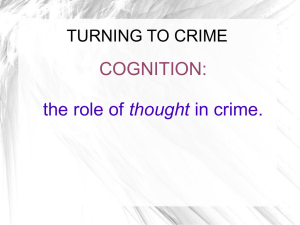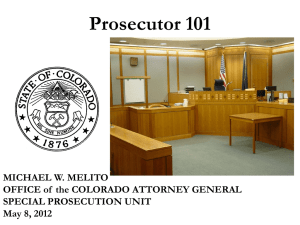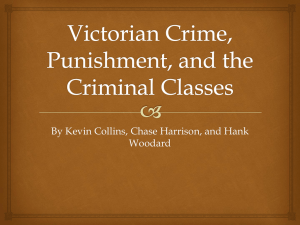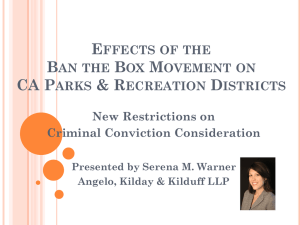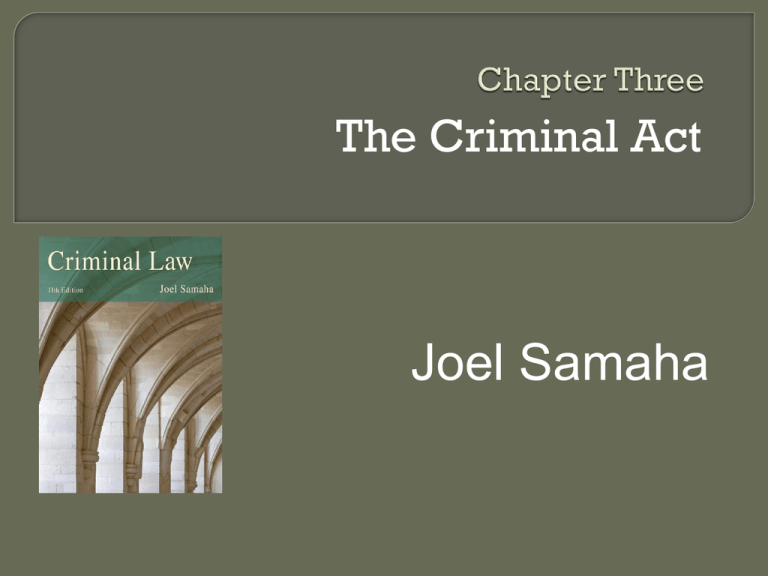
The Criminal Act
Joel Samaha
To be able to identify the
elements of, and to explain why,
the voluntary act is the first
principle of criminal liability.
To be able to differentiate
conduct crimes from bad result
crimes
To be able to distinguish between
criminal conduct and criminal
liability and therefore
punishment.
To understand and appreciate the
importance of requiring a
voluntary act before there can be
a crime
.To understand the legal
definition of a voluntary act
To identify the circumstances
when, and to be able to explain
why, status is treated, sometimes,
as an affirmative act
To be able to understand how the
general principle of actus reus
includes a voluntary act and how
it is viewed by the constitution.
To identify the circumstance
when, and to be able to explain
why, omissions are treated as
acts.
To understand and identify the
circumstances when, and to be
able to explain why, possession
can be treated as an act.
To know the different types of
possession recognized by the law
In
order to have criminal liability there
must be criminal conduct
Criminal conduct is conduct that is
without justification or excuse
Voluntary act is the “conduct” part of
criminal conduct
Many crimes don’t include a criminal
intent or bad result, but only rarely does
a crime not require a criminal act
Actus
Reus—the criminal act
Mens rea—the criminal intent
Concurrence—the requirement that the
criminal intent trigger the criminal act
Attendant circumstances (when a
crime does not require the mens rea, it
generally requires some attendant
circumstance)
Bad result causing a criminal harm
Corpus
delicti = “body of crime” but it
doesn’t necessarily mean a physical body.
It refers, instead to the elements of a crime
Criminal conduct = criminal act triggered
by the criminal intent
Criminal act = voluntary bodily movement.
Conduct crimes = crimes which require a
criminal act triggered by criminal intent
Bad result crimes
• Some serious offenses include all five elements
• Voluntary act (criminal act)
• Mental element (criminal intent)
• Circumstance element
• Causation
• Harm
Criminal Homicide is an example of bad
result crime
Punish
people for what they do, not who
they are
Punish people for what they do, not what
they think
Manifest criminality—in order to have
criminality, attitudes have to turn into
deeds. Deeds leave no doubt about the
criminal nature of the act
Voluntary
Act-Conduct that includes a
voluntary act satisfies the voluntary act
requirement
One voluntary act is enough rule
Voluntary act is an absolute requirement
for criminal liability
Criminal Intent? Read the following
scenario and determine whether or not mens
rea exists
Sam sells cocaine believing that it is sugar;
does mens rea exist? Why or why not?
Sam sells cocaine in the honest but mistaken
belief that it is legal to do so; does mens rea
exist? Why or why not?
Facts: Burrell, the
defendant, was convicted by
jury of manslaughter.
Issues: Burrell argued there was an error in jury
instruction regarding criminal liability
Holding: Upheld trail courts refusal to instruct
the jury that Burrell’s act of pulling the trigger
must have been a voluntary act was not an error
Facts: Cogdon, the
defendant, pled not guilty to
the murder of her daughter because she was
sleepwalking when she committed the offense.
Issue:
Was the act voluntary?
Holding: No. Acts committed while asleep do
not constitute a voluntary act
Automatism-unconscious
bodily
movements
Fault-Based Defenses-based on
creating a reasonable doubt about the
prosecution’s proof of a voluntary act
Affirmative Defenses-excuse defenses
of excuse for criminal liability, which take
place after the prosecution has proved
the defendant’s criminal conduct
Facts: Decina, the
defendant, was charged with
criminal negligence in the operation of a motor
vehicle resulting in death after hitting & killing 4
girls with her car as they crossed street
Issue: Decina suffered an epileptic seizure while
driving; therefore, she argued the act was not
voluntary
Holding: Defendant voluntarily got into the car
(knowing she was subject to epileptic seizure)
and thus the killing was not an involuntary act.
Status-character
of condition of a person or
thing
Most status don’t qualify as actus reus
Status can, however, result from voluntary act
• Example: meth addicts voluntarily use meth the first
time, and alcoholics voluntarily take their first drink
Some
conditions (status) result from no act at
all—we are born with those
characteristics/conditions: sex, age, race,
ethnicity
California
statute created crime of personal
condition. It punished Robinson for being
an addict, not for what he did. 90 day
sentence was held unconstitutional because
it punished him for his sickness. Decision
brought other statutes into question.
Texas statute made it a crime to be found
drunk in public. Court distinguished
Robinson and said that Powell was being
convicted for voluntarily being in public.
Very close case (plurality decision).
Failing
to act can satisfy the voluntary act
requirement
Criminal omissions
• Failure to act
Failure to report something required
• Failure to intervene to protect person or
property
Omissions
are only criminal if there is a
legal duty to act
Legal duties to act arise in
Statute provides the duty to act
several ways
Example: duty to report child abuse
Example: duty to file income tax returns
Example: duty to register as sex offender
Contract provides the duty to act
Example: emergency room doctor
Example: life guard
Example: law enforcement, fire fighters
Special relationship provides the duty to act
Example: parent-child
Example: employer-employee
NOTE: sometimes a special relationship is created by assuming
the care of another (see People v. Oliver)
Criminal
omissions cannot arise out of
failure to perform moral duties
Most
states impose no duty to render aid to
an imperiled stranger or call for help
• Good Samaritan Doctrine – creates (statutory)
duty for stranger to render aid
Only a few states
• American Bystander Approach—no legal duty
to rescue or summon help for someone in
danger even if there is no risk in doing so
Most states follow this approach
Review the Good Samaritan Doctrine of your state.
What does it say is the responsibility of the
Good Samaritan?
What is the level of assistance the Good
Samaritan should provide?
What (if any) are special exceptions to the
Good Samaritan Doctrine?
Is there a penalty for not abiding by the Good
Samaritan Doctrine?
Facts: Pestinakas, the defendants, verbally agreed to
care for Kly, an ill man, who suffered from weakness of the
esophagus which hindered his ability to swallow. Kly died
while in the defendants care from starvation and
dehydration.
Issue: Did the defendants have a legal duty to care for
Kly?
Holding: Yes. A failure to perform a duty imposed by
contract may be the basis for a charge of criminal
homicide. The jury instruction was appropriate.
Facts: Oliver, the defendant, was at her home with
Cornejo when he “shot up” and collapsed. Oliver was
unable to rouse him and left him on the floor. Cornejo
never regained consciousness and later died
Issue: Did Oliver have a “special relationship” with
Cornejo that created a legal duty?
Holding: Yes. A special relationship can be created by
assuming the care of an individual. The assumption of
care creates a legal duty, the failure of which constitutes a
criminal omission.
Facts: While caring for his girlfriend’s infant daughter,
Miranda, the defendant, called 911 and reported that the
child was choking on milk. At the hospital, it was
determined the child had multiple rib fractures and other
injuries.
Issue: Did Miranda have a legal duty to his girlfriends’
baby?
Holding: Yes. A defendant, acting as a father figure to
the victim assumed a “familial relationship” (even though
there was no marriage or blood relationship), upon which
a duty of care may be established
Possession
is not an act, it’s a passive
condition
Legal fiction makes possession a voluntary
act
Criminal possessions include possession of:
(see list)
• illegal weapons, illegal drugs, drug
paraphernalia
• alcohol by minors…
Reason
we engage in legal fiction of
pretending possession is an act:
• is in our desire to prevent worse crimes
• most people get possession through a voluntary
act
Actual
possession—having actual
physical control (the item is located on
the person)
Constructive
possession—the person
has the right to control the item, but it is
not on their person
Actual and Constructive possession can take two
forms: Knowing possession or mere possession
Knowing possession—person is aware what they
have on them or what it is that they have control over
• Most states require possession to be knowing to be
criminal act
Mere possession—person is not aware what they
have on them or what they have control over
• Either don’t know they have it, or don’t know what it is
they have
• Only two states hold that mere possession can be a
criminal act
Who is in possession?
Trent is a practitioner of the trap shooting and is in
possession of a rifle that he uses to practice with. He knows
this rifle is illegal in the state he is living in. Trent asks his
friend John to keep his rifle in his car. The police find John
in possession of the rifle. John reports he is not the owner
of the rifle and explains that it belongs to Trent. John
explains that Trent gave it to him to hold a few days ago.
Can both Trent and John be charged with the possession
of the rifle? Why or why not?
Facts: Miller, the defendant, was convicted by jury of
possession of cocaine and marijuana. The defendant was
the passenger in the vehicle where the drugs were found
Issue: Did Miller have possession of the drugs?
Holding: It is not necessary for the State to prove literal
physical possession of drugs in order to prove possession.
Miller was guilty of possession of marijuana, not cocaine.
Facts: Kastl, the defendant, was a juvenile and one of 5
passenger in a vehicle parked in a parking lot. Officers
observed beer cans around and in the vehicle.
Issue: Did Kastl possess alcohol?
Holding: Yes. Constructive possession is sufficient to
prove possession of contraband


